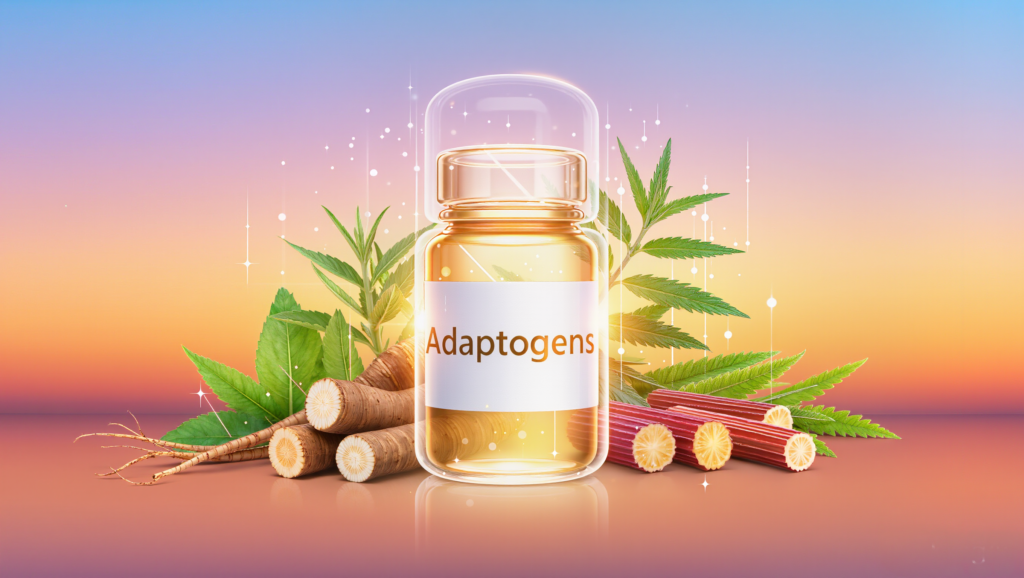For decades, Prozac and other SSRIs have dominated the discussion around anxiety and depression relief. These drugs revolutionized psychiatric treatment and are still the go-to choice for many serious conditions. But today, a new wave is cresting: natural remedies, and especially adaptogens, are gaining fans for their gentleness, holistic effects, and surprising clinical support. As more people seek safe, side-effect-friendly ways to calm their anxiety, adaptogens—herbs that help the body adapt to stress—are becoming the new face of mental wellness.
What’s behind the shift? Is it wishful thinking, placebo, or true medical progress? Let’s explore the science, clinical trials, and real-world results that are pushing adaptogens to the forefront and changing the way we think about anxiety management.
What Are Adaptogens? Roots, Herbs, and Stress Resilience
Adaptogens are a class of botanicals (including roots, herbs, and mushrooms) with a unique claim: they help the body withstand, recover from, and adapt to stress—whether mental, physical, or environmental. Unlike sedatives or stimulants, adaptogens don’t simply blunt symptoms; they work more subtly, improving resilience and restoring equilibrium in multiple systems (nervous, endocrine, immune).
How Do Adaptogens Work?
Clinical and cell studies show adaptogens:
- Stabilize the hypothalamic-pituitary-adrenal (HPA) axis—the body’s central stress management system.
- Moderate production of stress hormones like cortisol, lowering levels in times of high tension.
- Protect neurons and immune cells from damage caused by chronic stress.
- Enhance focus, energy, and overall well-being—without overstimulation or sedation.
Their effects are not instant but build steadily with consistent use—think of adaptogens as slow, quiet tutors for nervous system health.
Adaptogens vs. Prozac (SSRIs): Why Are People Switching?
| Factor | SSRIs (Prozac, Sertraline, etc.) | Adaptogens (Ashwagandha, Rhodiola, etc.) |
|---|---|---|
| Mechanism | Boost serotonin / block reuptake | Regulate stress response, balance neurotransmitters |
| Speed | Slow onset (2-6 weeks) | Gradual, several days to weeks |
| Side Effects | Sexual dysfunction, weight gain, sleep | Mild, rare—GI upset, headaches, allergy |
| Withdrawal Risk | High, esp. after long-term use | Very low |
| Drug Interactions | Many, including with herbs | Few, but caution when combined with SSRIs |
| Efficacy | Most effective for moderate-severe cases | Best for mild-moderate stress and subclinical anxiety |
| Accessibility | Prescription only | OTC, supplements, teas |
The shift isn’t about abandoning medication for everyone; rather, it’s about expanding treatment options, especially for those with mild anxiety, burnout, work stress, or who want to avoid pharmaceutical side effects.
Top Adaptogens for Anxiety: Clinical Evidence
Ashwagandha (Withania somnifera)
- Multiple randomized controlled trials show that ashwagandha can significantly reduce anxiety, stress, and serum cortisol levels in adults with mild to moderate symptoms, often outperforming placebo and approaching SSRIs for effect size in some studies.
- Mechanisms: HPA axis modulation, antioxidant support, direct action on GABA and serotonin pathways
Rhodiola (Rhodiola rosea)
- Proven to alleviate anxiety, improve mood, and reduce fatigue, with results in as little as 14 days in controlled studies.
- Also helps stabilize the gut-brain axis—a hot spot for stress and emotional reactivity.
- May enhance cognitive function and physical endurance alongside mood balancing.
Holy Basil (Ocimum sanctum)
- Shows rapid effect on symptoms of anxiety and low mood; modulates stress hormones and supports focus.
- Small studies suggest improvements in sleep quality and emotional resilience.
Eleutherococcus/Siberian Ginseng and Schisandra
- Eleutherococcus also know as Siberian Ginseng is widely studied for stress-induced fatigue and anxiety, with lasting effects on performance and resilience.
- Schisandra chinensis boosts mental performance and may improve symptoms of stress-induced depression and exhaustion.
Other Herbs (for mild anxiety support)
- Valerian, passionflower, lemon balm, and lavender are consistently noted for gentle relaxation, sleep improvement, and mild anxiety relief.
Are Adaptogens As Powerful As SSRIs? Where Evidence Is Strong—And Weak
Most adaptogen trials compare effects to placebo or mild anxiolytics; for moderate to severe psychiatric conditions, SSRIs remain the gold standard. But for the growing number of people with “subclinical” anxiety, work stress, or insomnia—who don’t want or need medication—adaptogens offer an appealing, low-risk solution.
Recent meta-analyses of major herbs (e.g., Ashwagandha, Saffron, Rhodiola) show comparable benefit to standard medications in some cases, with fewer side effects and better long-term safety. Botanical formulas may also enhance sleep, reduce fatigue, and improve mental clarity—effects not commonly attributed to SSRIs.
Safety, Interactions, and Considerations
- Adaptogens are overwhelmingly considered safe for most people when taken as recommended. Rare adverse events include mild digestive upset, headache, or allergy. However, some can interact with antidepressants (SSRIs, SNRIs, etc.), particularly through drug-metabolizing enzymes—the most frequent concern is combining certain adaptogens with prescription medications, which can occasionally trigger serious adverse events.
- Always consult your healthcare provider before adding adaptogens if you’re currently prescribed SSRIs or other psychiatric meds, or if you have underlying medical conditions.
Why Is the Public Turning to Adaptogens?
1. Dissatisfaction with Pharma Side Effects
Many users report unwanted weight gain, sexual dysfunction, sleep disruption, emotional blunting, or difficult withdrawal with SSRIs. Adaptogens are valued for their gentle, holistic profile and lower risk of dependence.
2. Demand for Holistic, Preventative Care
Modern wellness places emphasis on prevention, natural therapies, and supporting multiple aspects of health—energy, resilience, sleep, immune function—beyond just mood.
3. Clinical Validation and Tradition
There’s growing support from both randomized trials and ethnobotanical tradition—adaptogens aren’t just folk remedies but are now validated by robust research.
4. Accessibility and Empowerment
Adaptogens are widely available as teas, powders, and supplements, often without prescription or insurance hassles. Users can self-direct their wellness approach, adjusting herbs and doses as needed.
Building Your Adaptogen Anxiety Protocol: Sample Routine
Morning
- Rhodiola or Eleuthero for energy, stress resilience, brain focus
Afternoon
- Holy basil or Schisandra for stress balancing and mood protection
Evening
- Ashwagandha or Valerian for relaxation and sleep quality
Tip: Start one herb at a time, track emotional, physical changes, and rotate seasonally or per stress patterns. Always choose high-quality, well-sourced extracts.
Final Thoughts: The Future of Anxiety Relief Is Adaptogenic
SSRIs like Prozac transformed mental health care, but the explosion of research into adaptogens is unlocking new, softer approaches to anxiety relief. Science now shows that herbs like Ashwagandha, Rhodiola, Holy Basil, and Eleuthero work with the body—rather than against it—to restore calm, energy, sleep, and resilience. For mild to moderate emotional turbulence, adaptogens aren’t just trending—they’re offering a more humane, empowering future for anxiety management.
Disclaimer: As always, consult with a medical professional, especially if you are currently taking psychiatric medications or managing serious conditions.
Did you find this article helpful? Support us by following us on our social media for more content on natural health and wellness:: Youtube, Instagram, Facebook, Pinterest, Twitter (X)








